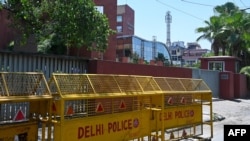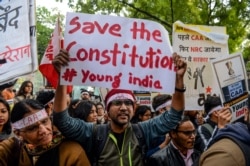A criminal complaint filed against three prominent journalists over social media posts has been criticized by analysts as a further example of India's retaliation against the news media.
A first information report — the start to filing a criminal complaint in India — names news website The Wire, Twitter's India office, Washington Post columnist Rana Ayyub, freelancer Saba Naqvi, and Mohammed Zubair, the co-founder of fact-checking website Alt News, as well as Indian lawmakers.
They are accused of criminal conspiracy, insulting religious belief, promoting enmity between religious groups and provocation to cause a riot.
Geeta Seshu, co-editor of Free Speech Collective, an Indian organization that promotes freedom of expression, told VOA that the accusations are "unwarranted and excessive."
"To say the tweets 'promote enmity between different groups,' et cetera, is to attribute sinister motives to these journalists, all of whom have an otherwise reputed track record as journalists. There are other ways of dealing with news that, as the police claim in this instance, is inaccurate or even false," Seshu said.
At the center of the complaints is a video of an elderly man being beaten and taunted earlier this month. The incident was reported by The Wire and several other publications, and shared widely on social media, initially as an apparent hate crime.
Police in the district of Ghaziabad, where the attack took place, ruled out calling the incident an assault on the Muslim community, and said the alleged attackers, who were detained, were angry about items they'd bought from the man.
Avantika Mehta, a freelance journalist who has written for outlets including VICE and the South China Morning Post, said she thinks the complaint lodged against reporters is "an overreach on the government's part, and certainly goes against common practice and sense."
"I wish I could say it is a surprising development, but that would be far from the truth," Mehta said, adding, "The current government has been curtailing freedom of press and speech from the moment they came to power in 2014."
Uttar Pradesh authorities did not respond to VOA's requests for comment.
VOA's attempts to interview the journalists named in the FIR were unsuccessful.
Mehta said all three journalists named in the complaint had retracted their posts and "apologized as soon as it became clear that they weren't privy to all the facts."
M. Shafey Kidwai, a professor at Aligarh Muslim University's department of mass communication, said that in the age of social media, journalists sometimes rush to put out a story before knowing all the details.
"We have been living in a fact-free world," Kidwai said, adding that emotion is given precedence over details. "In governance-related issues it becomes more visible."
"Cross checking of facts has become a thing of the past. Now Twitter is taken as the most reliable source. One can hardly see rigorous event reporting," Kidwai said.
Media experts, including the Editor's Guild of India, noted that only a few journalists and one news website were named in the FIR despite the fact that the video was widely shared and reported on.
"It is quite evident that the police have been discriminatory in targeting those media organizations and journalists — when thousands had tweeted the video — that have been critical of the government and its policies," the guild said in a statement.
Pamela Philipose, public editor at The Wire and author of Media Shifting Terrain: Five Years That Transformed the Way India Communicates, told VOA that the legal complaint was filed against "prominent Muslim media professionals."
She added that Ghaziabad police had quickly "arrived at the conclusion that the hate crime charge was fake and was 'intended to incite communal hatred between the religious communities' and 'disturb the public order.' "
"All this is happening, it must be noted, in a climate of rising majoritarianism in the country with minorities, especially Muslims, coming under the threat of a new law like the Citizenship Amendment Act of 2019 that undermines their right to equal citizenship," Philipose said.
The act sought to make it easier for migrants from three neighboring countries to apply for citizenship if they came from one of six religious minorities. Critics said the change excluded Muslims and was unconstitutional, and mass protests broke out after India's Hindu nationalist majority parliament passed the act in December 2019.
The government has denied discriminating against Muslims and said changes were implemented to stop illegal immigration.
Neither India's Ministry for Information and Broadcasting nor its Communication and Information Technology Ministry responded to VOA's requests for comment.
Shrinking freedoms
Media and digital rights organizations say freedoms are declining in India, with watchdog Reporters Without Borders (RSF) saying authorities often use "prosecutions to gag journalists critical of authorities."
Restrictions on internet freedoms have further resulted in India's dropping from "free" to "partly free" in Freedom House's annual analysis. The rights group cited Hindu nationalist campaigns targeting "anti-national" content, and authorities suspending access to the internet
In response to criticism, India set up a government panel to look into RSF's findings, Scroll reported. The panel found criticism was caused by "Western bias" and that a "vibrant and regular" relationship between authorities and media and other positive actions were not given "considerable visibility in the international arena."
Kian Vesteinsson, a research analyst for Freedom House's technology and democracy program, said the ruling Bharatiya Janata Party, or BJP, increasingly suppresses online criticism to support the government's agenda.
While all internet users should work to limit the spread of misinformation, the first information report filed in this case seems disproportionate and designed to silence dissenting voices, Vesteinsson said.
"The FIR targets Twitter, yet another instance of the Indian government's effort to bring social media platforms in line with its repressive aims," Vesteinsson said.
A climate of self-censorship already exists in India, especially in mainstream media, said Seshu, of the Free Speech Collective.
In a December 2020 report for the group, Seshu found a rise in legal action against media, with over 40 percent of the cases in the past decade taking place in 2020.
"There are a substantial number of brave journalists who do stick their necks out. However, they find the space and media platforms to voice or report their views shrinking," Seshu said.
Urvashi Sarkar, a freelancer based in Mumbai, also believes authorities are "increasingly misusing laws to punish journalists," especially in Uttar Pradesh.
Sarkar cited the arrest in October of Siddique Kappan, a freelancer who was detained while entering Uttar Pradesh to cover a rape case that was making headlines across the country. Kappan is charged with sedition and other unlawful activities.
The June complaint over social media posts was also filed in Uttar Pradesh. At least one of the three journalists named in it has been granted a four-week protection from arrest, according to reports.





